
Commercially Compostable vs Home Compostable
BP Wholesale | June 11 2024If you’re looking for food packaging suppliers for your business, the first thing you need to understand is how their products would impact your customer base.
Are you trying to navigate the world of compostable materials? Whether you're a business owner or a conscientious consumer, understanding the difference between commercial and home compostable products is crucial.
In this guide, we'll dive into what each type means, why they matter, and how you can make the best choices for our planet.
What Does "Compostable" Mean?
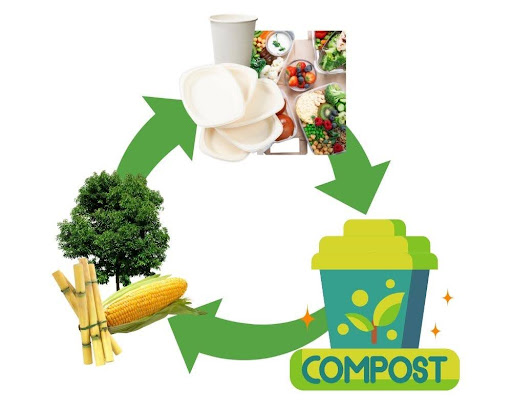
"Compostable" refers to materials that can break down into natural elements in a compost environment, leaving no toxicity in the soil. This process helps reduce waste and returns nutrients to the earth, aiding in the reduction of greenhouse gas emissions and reliance on landfill space.
How to Tell Compostable and Recyclable?
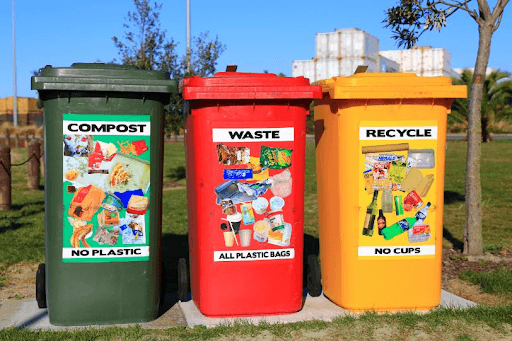
In the UK, some local councils allow packaging to be placed in their Food Waste bins.
Compostable Materials:
Materials: Commonly made from plant-based materials like corn starch, sugarcane (bagasse), or paper with a biodegradable lining.
Appearance: Often matte or has a slightly less polished look compared to traditional plastics; may be labeled with a green or brown color coding.
Disposal Instructions: Usually specify that the item can be composted where industrial facilities are available or can be home composted if labeled appropriately.
Recyclable Materials:
Recycling Symbols: Look for the recycling triangle with a number inside (1 through 7), which indicates the type of plastic used and its recyclability.
Materials: Common materials include PET (#1), HDPE (#2), and LDPE (#4) for plastics; aluminum and glass are also widely recycled.
Appearance: Recyclable plastics are often more rigid and have a clearer or more polished appearance than compostables.
Now we go to the difference between Commercially Compostable vs Home Compostable.
Commercially Compostable vs Home Compostable: In a Nutshell
Commercially compostable items are designed to:
- Break down in industrial composting facilities. These facilities maintain specific conditions, including higher temperatures (between 50°C and 60°C)
- Usually within 60 to 90 days due to optimized conditions
- Items should meet standards such as ASTM D6400 or EN 13432
On the other hand, home compostable means:
- products are suited for breaking down in backyard compost bins or heaps.
- Typically within 90 to 180 days
- Mostly organic waste like food scraps, and lighter bioplastics that do not require high temperatures to break down
- May carry labels like TÜV Austria's OK Compost HOME
- Easily managed on a personal or community level
What is certified home compostable and industrial compostable?
When selecting between home and commercial composting for packaging and bioplastics, it's crucial to consider specific certifications. These certifications confirm whether items, even if they seem plant-based or biodegradable, are suitable for backyard composting setups or require an industrial composting facility to properly decompose.

Certified home compostable AS 5810
- Certification Type: Home compostable
- Certifying Body: Australasian Bioplastics Association (ABA)
- Applicability: Australia and New Zealand
- Testing Standards: Must achieve a minimum of 90% biodegradation within 180 days and 90% disintegration into pieces smaller than 2mm within 12 weeks, ensuring no harmful effects on compost, plants, or earthworms.
.png)
Certified industrial compostable AS 4736
- Certification Type: Industrial compostable
- Certifying Body: Australasian Bioplastics Association (ABA)
- Applicability: Australia and New Zealand
- Testing Standards: Requires at least 90% biodegradation within 12 weeks and complete disintegration within 6 months under controlled industrial conditions.
What is Commercially Compostable
Commercial composting facilities process waste on a large scale using controlled conditions like temperature and humidity. This system is ideal for compostable foodservice packaging HOWEVER, some materials such as sugarcane packaging can both be home and commercially compostable products. More of this later.
But what does commercially compostable only mean? It implies that the material requires an industrial facility to decompose within a timeframe acceptable by certain standards, such as the AS4736.
Commercial compostable facilities maintain controlled environments with specific conditions such as higher temperatures, regulated moisture levels, and active microbial processes, which are necessary to efficiently decompose these materials.
Standards and Regulations for Commercially Compostable Products
For a product to qualify as commercially compostable, it must meet specific criteria set forth by industry standards.
According to ASTM Standards D6400 and D6868, commercially compostable plastics must decompose at a rate similar to other organic materials within the composting facility, typically within a 6-month period.
What Does “Commercially Compostable ONLY” Mean?
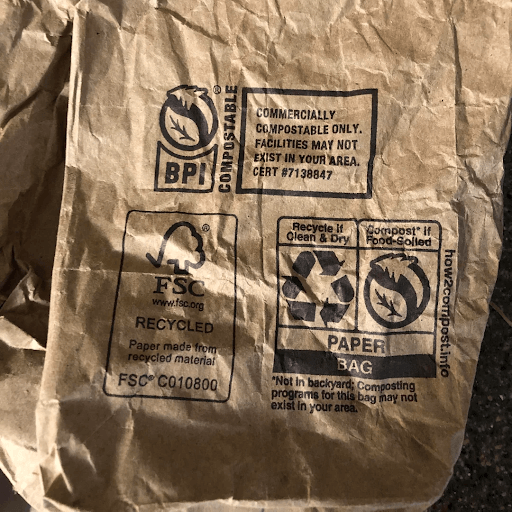
Photo Source: Reddit
The term "commercially compostable only" refers to products and materials that are designed to break down specifically in commercial or industrial composting facilities, rather than in home composting systems.
Here’s why some products are labeled as "commercially compostable only":
- Temperature Requirements: Commercial composting facilities can reach and maintain higher temperatures (between 50°C and 60°C) which are essential for breaking down tougher, more resilient materials like certain types of bioplastics.
- Faster Decomposition: These facilities utilize systems that accelerate the decomposition process, allowing for the breakdown of compostable materials within a timeframe of about 90 to 180 days. This rapid process is necessary to handle the larger volumes of waste typical of commercial operations.
- Controlled Environment: The controlled settings in commercial facilities ensure that the decomposition process is consistent and complete, reducing the likelihood of partially composted materials ending up in the finished compost, which could be detrimental to the soil and plant health.
- ASTM Compliance: Products labeled as commercially compostable must meet specific standards such as ASTM D6400 or D6868, which require that materials break down at a rate comparable to other known compostable substances and leave no toxic residue.
- Specialized Handling of Contaminants: Commercial facilities are better equipped to handle materials that might contain inks, adhesives, and coatings that require specific microbes or conditions to break down completely.
How Do I Know if the Food Packaging is Compostable?
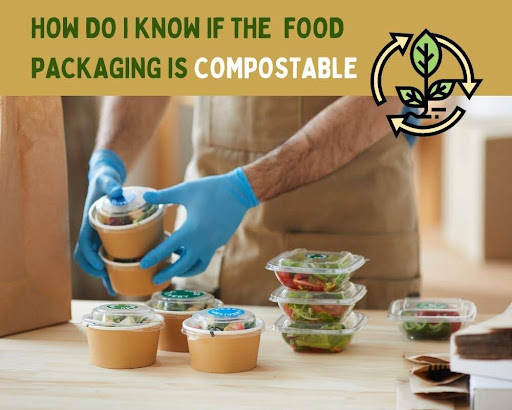
Determining whether the food packaging is compostable involves a few key steps and considerations. These considerations ensure it meets the appropriate standards and is suitable for either home or commercial composting systems.
Here’s how you can identify compostable packaging:
- Look for Certifications and Labels: The most reliable way to determine if packaging is compostable is to look for specific certification labels that indicate it meets established composting standards. Common certifications include:
• ASTM D6400: This certification is for products designed to be composted in commercial facilities in the United States.
• ASTM D6868: This standard covers packaging that incorporates biodegradable plastics as part of a composite material, such as coated paper or cardboard.
• EN 13432 (Europe): Similar to ASTM D6400, this certification ensures that products are compostable in commercial composting facilities and that they break down within a specific time frame, leaving no toxic residues.
• TÜV Austria (OK Compost HOME and OK Compost INDUSTRIAL): These labels indicate whether an item is suitable for home composting or requires industrial facilities. - Check the Materials: Packaging that is typically compostable includesuncoated paper, cardboard, and some plant-based plastics. Be wary of plastics labeled as “biodegradable” without any specific compostability certifications, as these might not decompose in a composting environment.
- Understand Local Composting Regulations: Local regulations can impact what materials are accepted for composting. Contact your local waste management services to find out what types of compostable materials they accept and whether they have commercial composting facilities.
- Beware of Greenwashing: Some products may claim to be environmentally friendly or use vague terms like "green" or "eco-friendly" without having the certifications to back those claims. Always look for specific, verifiable composting certifications.
Examples of Greenwashing
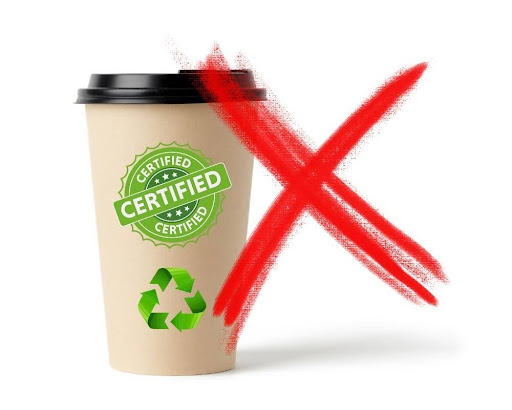
In this instance, a company has created its own ‘certified compostable logo.’ This practice, known as greenwashing, has not been authenticated by the ABA.
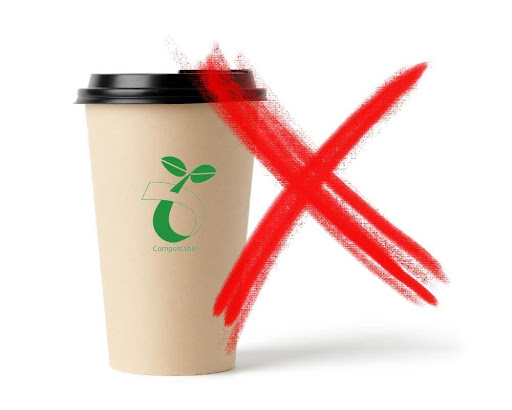
In this case, the company displays the seedling logo without a certification number underneath. This omission can leave consumers unsure of how to properly dispose of the product.
Both commercially and home compostable materials provide a more sustainable option compared to traditional packaging materials, significantly reducing environmental impact. For food service businesses, such as restaurants and caterers, choosing compostable packaging is particularly crucial.
Even if you can't ensure correct disposal by every customer, choosing compostable packaging guarantees it won't harm the environment, no matter where it ends up.
Choosing the Right Compostable Packaging
For businesses in the food service industry, the choice between home and commercially compostable products can hinge on several factors, including:
- Availability and Convenience: Whether the customer opts for commercial or home compostable products can depend largely on your local infrastructure and personal capability to manage a compost system.
- Environmental Impact: Both methods support waste reduction and help reduce landfill use, but commercially compostable options can handle more types of materials and do so faster, thanks to controlled conditions.
- End Use of Compost: The quality of compost generated from both processes can vary, with industrial facilities often producing more consistent and widely usable compost outputs.
In a nutshell, the choice between commercial and home compostable depends on specific needs, available facilities, and environmental goals. Both play significant roles in the broader context of sustainable waste management and resource recovery.
LET'S GET STARTED
EXPLORE OUR COLLECTION OF COMPOSTABLE FOOD PACKAGING:
Take Out Containers
Tableware
Cups and lids
Bags
.jpg)
.jpg)
.jpg)
.jpg)
This article is brought to you by B&P Wholesale, a leader in the wholesale food packaging industry with over 40 years of experience. Our deep commitment to sustainability and innovation has driven us to provide insightful, reliable content that helps businesses and consumers make informed decisions about their environmental impact.
You might also want to check out our Aqueous Coated Paper lids for hot drink cups, catering for those seeking plastic alternatives. The water-based coating allows these lids to break down easily, ensuring they are industrially compostable without special treatment.